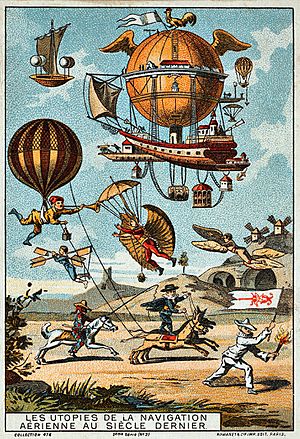Utopia facts for kids
A utopia is a name for an imaginary place or society that is considered perfect. In a utopia, everything works perfectly, including laws, politics, and daily life. It's like a dream world where everyone is happy and problems don't exist.
The word "utopia" was created by Sir Thomas More in 1516 for his book called Utopia. This book described a make-believe island in the Atlantic Ocean that had a perfect society. Since then, the word has been used to talk about any ideal society, whether it's real or just in stories. The opposite of a utopia is a dystopia, which is a society where everything is bad and people are unhappy.
People have imagined many different kinds of utopias. Some are based on political ideas, others on how money works (economics), religion, or even how we live with nature (ecology). Some of these ideas have been shared in books, while others have been attempts to create real communities. However, trying to build a perfect utopia in real life often faces many challenges. Many utopias in books are actually a way for writers to make fun of or criticize the societies they live in.
Contents
Famous Utopia Stories
Many writers have explored the idea of a perfect world in their books. Here are some well-known examples:
Early Ideas of Utopia
- Plato's Republic by Plato (around 380 BCE): This is one of the very first ideas of a perfect society. Plato imagined a city-state run by wise philosophers.
- The City of God by Augustine of Hippo (413–426 AD): This book describes an ideal city, which is seen as the perfect example for all Christian utopias.
Utopias in Later Books
- New Atlantis by Francis Bacon (1627): This story describes a fictional island where people are dedicated to learning and scientific discovery.
- Gulliver's Travels by Jonathan Swift (1726): While it seems like a travel story, this book actually makes fun of human nature and the idea of perfect societies.
- Erewhon by Samuel Butler (1872): The title "Erewhon" is "Nowhere" spelled backward. This book is a funny look at a society with strange rules and customs.
- News from Nowhere by William Morris (1892): This story imagines a future society without politics, where people own things together and make decisions democratically.
- A Modern Utopia by H. G. Wells (1905): Wells explores what a perfect world might look like in modern times, with advanced technology and a global government.
- Nineteen Eighty-Four by George Orwell (1949): This is a famous example of a dystopia, showing a future where the government has total control and freedom is lost.
Images for kids
-
New Harmony, Indiana, was an attempt to create a utopian community, as proposed by Robert Owen.
See also
 In Spanish: Utopía para niños
In Spanish: Utopía para niños




